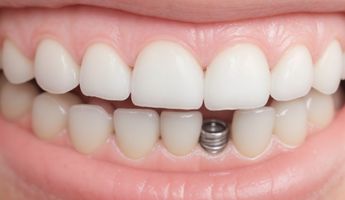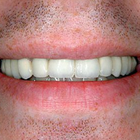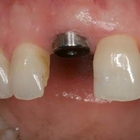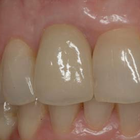Dental Implant in Croatia
Search and Compare the Best Clinics and Doctors at the Lowest Prices for Dental Implant in Croatia

Find the best clinics for Dental Implant in Croatia
With Medijump you can browse 14 facilities offering Dental Implant procedures in Croatia. The cheapest price available is $650 in Zagreb. And for the cheapest price globally, prices start from $1 in Vietnam.
Dental Implant in Zagreb
Price: $ 650
Dental Implant in Split
Price: $ 736
Vietnam offers the best prices Worldwide
Price: $ 1
Spalato Dental, located in Ul Gospe u siti, Split, Croatia offers patients Dental Implant procedures among its total of 4 available procedures, across 1 different specialties. The cost of a Dental Implant procedure ranges from $784 to $1,035, whilst the national average price is approximately $827. There are many specialists available at the Dental, with 6 in total, and they have multiple recognized accreditations, including: ISO Certification - International Organization for StandardizationHSK - Hrvatska stomatološka komora
From 4 verified reviews
Татьяна Сергеевна М., 27 August 2020
These charming ladies-doctors are amazing! All the staff is so kind and attentive. We are tourists and suddenly my sister, who doesn.t talk Croatian or English, started to feel sharp pain. We were helpless until we came to this clinic. They were all booked but didn.t refuse to help. And they managed to find out the reason of the pain and brought a great relief. I am sooo thankful, the doctors saved our holiday.Dear doctors, you are the best! My sister is already much better! I highly recommend your "ministry of smile"!
From 14 verified reviews
medico anestesista, 15 September 2020
Hat alles sehr gut und unkompliziert geklappt. Werde sicher wieder hingehen.
From 9 verified reviews
Dutch & Dalma, 17 September 2020
Great, professional and dear doctor. Great access and prices. More than satisfied. All recommendations. 😊
From 33 verified reviews
Krešimir Đaković, 16 July 2020
Great, professional, polite. Prices ok especially for cash. Special praise to Dr. Razić, save all and the worst teeth quickly and professionally :)
From 55 verified reviews
Marijana Ljolje, 16 September 2020
Good atmosphere ,very kind stuff,excellent service
From 22 verified reviews
Lovre Makjanic, 09 April 2020
A top-quality team of experts led by Dr. M.Jezin, who I recommend to anyone who wants to have a beautiful smile and healthy teeth.Thanks so much, you are the best !!!
Hvar Esthetic Dental, located in Trg Sv Stjepana, Hvar, Croatia offers patients Dental Implant procedures among its total of 73 available procedures, across 3 different specialties. Currently, there's no pricing information for Dental Implant procedures at Hvar Esthetic Dental, as all prices are available on request only, whilst the national average price is approximately $827. All procedures and treatments are undertaken by the lead specialist at the Dental, and they are not accredited by any recognized accreditations institutes
Dr. Jadranko Jerković, located in Trg Sv Stjepana, Hvar, Croatia offers patients Dental Implant procedures among its total of 37 available procedures, across 2 different specialties. The cost of a Dental Implant procedure starts from $1,172, whilst the national average price is approximately $827. All procedures and treatments are undertaken by the lead specialist at the Hospital, and they are not accredited by any recognized accreditations institutes
Policlinic Kustec, located in Ul grada Vukovara A, Zagreb, Croatia offers patients Dental Implant procedures among its total of 53 available procedures, across 3 different specialties. Currently, there's no pricing information for Dental Implant procedures at Policlinic Kustec, as all prices are available on request only, whilst the national average price is approximately $827. All procedures and treatments are undertaken by just a small team of specialists, with 3 in total at the Hospital, and they are accredited by HSK - Hrvatska stomatološka komora
Dental Care Dubrovnik Dr.Miroslav Korda, located in Trg Sv Stjepana, Hvar, Croatia offers patients Dental Implant procedures among its total of 37 available procedures, across 2 different specialties. Currently, there's no pricing information for Dental Implant procedures at Dental Care Dubrovnik Dr.Miroslav Korda, as all prices are available on request only, whilst the national average price is approximately $827. All procedures and treatments are undertaken by just a small team of specialists, with 3 in total at the Dental, and they are not accredited by any recognized accreditations institutes
Split Dent Dental Care, located in Ul Gospe u siti, Split, Croatia offers patients Dental Implant procedures among its total of 36 available procedures, across 2 different specialties. Currently, there's no pricing information for Dental Implant procedures at Split Dent Dental Care, as all prices are available on request only, whilst the national average price is approximately $827. All procedures and treatments are undertaken by the lead specialist at the Dental, and they are accredited by HSK - Hrvatska stomatološka komora
Mr. Sci. Ivo Matkovic Dr. Med. Dent., located in Ul grada Vukovara A, Zagreb, Croatia offers patients Dental Implant procedures among its total of 37 available procedures, across 2 different specialties. Currently, there's no pricing information for Dental Implant procedures at Mr. Sci. Ivo Matkovic Dr. Med. Dent., as all prices are available on request only, whilst the national average price is approximately $827. All procedures and treatments are undertaken by just a small team of specialists, with 3 in total at the Hospital, and they are accredited by HSK - Hrvatska stomatološka komora
Dental Center Štimac, located in Ul grada Vukovara A, Zagreb, Croatia offers patients Dental Implant procedures among its total of 36 available procedures, across 2 different specialties. Currently, there's no pricing information for Dental Implant procedures at Dental Center Štimac, as all prices are available on request only, whilst the national average price is approximately $827. All procedures and treatments are undertaken by just a small team of specialists, with 2 in total at the Dental, and they have multiple recognized accreditations, including: HSK - Hrvatska stomatološka komoraHPD - Hrvatsko Parodontološko Društvo
- Home
- Croatia
Compare Before & After Photos of _procedure_photos.phpDental Implant


Front view


Front view


Front view


Front view


Front view
WHY US?
At Medijump, we're making medical easy. You can search, compare, discuss, and book your medical all in one place. We open the door to the best medical providers worldwide, saving you time and energy along the way, and it's all for FREE, no hidden fees, and no price markups guaranteed. So what are you waiting for?

Free

Best Price

Widest Selection

Risk-Free
What you need to know about Dental Implant in Croatia

A dental implant is a medical device that provide support to artificial teeth. It's surgically placed into the jaw to act as a replacement for the root of a missing or damaged tooth, which in turn serves to hold a replacement tooth or bridge. It functions and looks much like a real tooth, restoring your ability to chew and improves your overall appearance. Dental implant surgery is considered as a better alternative to dentures or bridgework that does not fit well. It also offers a great option for people when they do not have enough natural teeth roots left to build denture or bridgework replacements.
Since dental implants eventually fuse with your jawbone over the span of several months, it won’t make noise, slip, or cause bone damage the way dentures or bridgework might. Dental implants also enable natural speech, look and feel like your own teeth, make eating easier, and improves your appearance. However, the surgery may involve several stages, and, in some cases, it may require two separate visits to the clinic to complete. Ensure to look for a specialist in a reputable clinic for the best results.
What is the cost of Dental Implant in Croatia?
Price differences abound in Croatia for Dental Implant based on the clinic, the proficiency of the surgeon, and the individual requirements of the patients. It's essential to realize that dental insurance usually doesn't cover the entire bill for this treatment, though it might cover a part. Several dental clinics provide finance schemes or payment alternatives to assist in easing the financial burden. For more precise cost estimates, reach out to your dental service provider or a nearby clinic.
What does a Dental Implant Procedure Involve?
Dental implant surgery generally requires several stages. Each stage may be performed under general or local anesthetic. The first stage is removing the damaged tooth. Then, if your jawbone is too soft or not thick enough, your dentist may perform bone grafting to create a more solid base for the implant. The bone graft may be natural (taken from another part of your body) or synthetic (a bone-substitute material). If you only need minor bone grafting, the implant surgery can be performed on the same day. However, if you need a significant amount of bone graft, the implant surgery may have to be postponed until the transplanted bone grows enough new bone to support the dental implant.
The next stage after the damaged tooth removal and bone graft (if you need one) is placing the dental implant. To do this, your dentist makes an incision to expose the bone and puts the metal implant post deep into the bone. At this stage, you will still have a gap where your tooth is missing. Your dentist will place a temporary denture for appearance. Once the metal implant post is placed, osseointegration begins. This is a process where the jawbone grows into the surface of the implant and can take several months to complete. After osseointegration is complete, your dentist will place the abutment, which is a small connector post that will hold your new tooth. The final stage, after the abutment is placed, is placing the crown, which is the tooth-looking part. You can choose between a removable crown and a fixed crown.
How Long Should I Stay in Croatia for a Dental Implant Procedure?
The length of your stay in Croatia for a Dental Implant depends on numerous considerations like the intricacies of the procedure, the quantity of implants required, and your personal recovery process. Each stage of dental implant surgery is done in separate appointments. After each appointment, you should be able to leave the hospital or clinic right away. However, you should stay in Croatia for at least 2 weeks for completion of the work, the initial recovery time, and follow-up checkups.
What's the Recovery Time for Dental Implant Procedures?
The recuperation duration following a Dental Implant or dental implant operation can widely vary and is shaped by multiple aspects. Initial healing of the tissue might require only a handful of days, but complete osseointegration (the fusion of the implant with the jawbone) generally spans several months. This window could be extended for patients requiring auxiliary procedures such as bone grafts, or those with prevailing health issues that may impede the healing process.
Post-procedure, it's not unusual to experience a degree of discomfort, which could manifest as minor pain, swelling of your gums and face, skin and gum bruising, and slight bleeding. Such symptoms are a standard phase of the recovery process and should alleviate within a fortnight. In this interim, it's advisable to stick to a soft diet to not overload the implant site with undue pressure. Any strenuous physical exertion should be put off to circumvent potential complications.
Maintaining excellent oral hygiene is paramount to facilitate healing and stave off infection. Regular brushing and flossing, being particularly gentle around the surgical area, coupled with rinsing your oral cavity with warm saline water, can contribute to keeping the region hygienic.
What sort of Aftercare is Required for Dental Implant Procedures?
After each stage of surgery, you may have to eat soft foods. Since you may experience swelling, bruising, pain, and minor bleeding, your dentist will prescribe pain medications or antibiotics to help ease your discomfort. During your recovery period, you need to avoid smoking as it can contribute to implant failure and complications.
No special care is required for dental implants. Nonetheless, you need to practice good oral hygiene in order to maintain the implant and your remaining natural teeth. Make sure to brush your teeth twice a day, floss daily, and rinse your mouth with an antiseptic mouthwash. You also need to see your dentist regularly and avoid damaging habits, such as chewing hard items.
What's the Success Rate of Dental Implant Procedures?
The efficacy of Dental Implant, alternatively referred to as dental implants, in Croatia, is typically impressive, boasting effectiveness percentages as high as 98% in some studies. This positions dental implants as one of the most reliable procedures within dental care's realm. Nevertheless, it's worth mentioning that the success rates might fluctuate, influenced by several factors.
The patient's overall health is a key determinant of the thriving outcome of a dental implant procedure. Individuals exhibiting optimal health usually witness higher success rates. Pre-existing health issues like diabetes, osteoporosis, and periodontal ailments can theoretically impact the efficacy of the implant.
Additional contributing factors to the success rate encompass the quality and abundance of the individual's bone structure. Patients boasting plentiful, healthy bone are ordinarily the perfect candidates for dental implants. However, those who have experienced bone loss might need to undergo a bone grafting procedure before the implant procedure. This step can provide a robust base for the implant and enhance the chances of a successful result.
Are there Alternatives to Dental Implant Procedures?
If you are not a candidate for dental implant surgery, or you simply do not want to undergo the procedure, you can opt for the alternatives. The alternatives include:
- Mini dental implants, which is a small type of dental implants. The structure is similar to regular dental implants, but are somewhat smaller in size. Unlike regular dental implants, dentists can often place mini implants only in one visit using local anesthesia. You may also be able to use your new teeth on the same day.
- A same-day implant is essentially similar to traditional dental implants. However, your dentist performs the whole process in just one day, skipping the process of wound healing and osseointegration.
- Implant-supported dentures or All-on-4 is an alternative if you need to fix a complete upper or lower set of teeth. During this procedure, four to six implants are placed into your jawbone as a base to attach and stabilize your denture.
What Should You Expect Before and After the Dental Implant Procedure?
Grasping what lies ahead before and post the Dental Implant can lessen potential worries and guarantee you are fully equipped for the upcoming journey. Prior to the procedure, your dental practitioner will conduct an all-inclusive dental assessment. This check-up may encompass dental X-rays and sophisticated 3D imaging to examine the status of your oral cavity.
The dental professional will also explore your medical history. If you're suffering from specific heart disorders or orthopedic implants, your dental practitioner might suggest antibiotics to avert infection. A personalized treatment blueprint, customized to your circumstances, will be constructed. This strategy takes into account factors like the amount of teeth you need substituted and the state of your jawbone. The procedure is typically carried out under local anesthesia to mitigate any discomfort.
Subsequent to the operation, experiencing slight unease is usual. You might witness inflammation of your face and gums, discoloration of your skin and gums, soreness at the insertion area, and insignificant bleeding. Your dental specialist will recommend medications to soothe these indicators. In case inflation, unease, or any other complications intensify in the days post-operation, it's crucial to reach out to your oral surgeon. Post-operation will require you to consume mushy foods as the operated site recovers. Moreover, you'll be guided to abstain from smoking, as it can hinder recovery and influence the triumph of the dental implant.
Following the positioning of the implant, the healing process, and fusion with the bone (osseointegration) transpire over an extended period. During this interval, maintaining robust oral cleanliness is vital. This involves frequent brushing, the use of dental floss, and cleansing with an antibacterial mouthwash. Periodic dental examinations are obligatory to track progress and confirm the well-being and effectiveness of the implant.
What are Potential Risks of Dental Implant?
Despite Dental Implant boasting remarkable effectiveness, it is, as any surgical operation, not without risks and potential difficulties. The chances of encountering these issues are often minute and irregularities are infrequent, yet it remains critical for patients to comprehend these possibilities before undertaking the procedure.
Complications and side effects may include:
- Implant failure
- Nerve injury
- Infection
- Sinus problems
- Damage to surrounding structures, such as other teeth or blood vessels
How long does a Dental Implant last?
The durability of a Dental Implant is heavily reliant on the individual's oral cleanliness and general wellbeing. Nonetheless, with appropriate upkeep and care, dental implants have the potential to stand the test of time. The titanium pillar inserted into the jawbone during surgery is crafted to be everlasting, while the dental cap fastened to the anchor may necessitate substitution every decade or decade and a half due to normal usage. Yet, with outstanding dental management and habitual screenings, the cap has the potential for lifelong endurance.
Whilst the information presented here has been accurately sourced and verified by a medical professional for its accuracy, it is still advised to consult with your doctor before pursuing a medical treatment at one of the listed medical providers
No Time?
Tell us what you're looking for and we'll reachout to the top clinics all at once
Enquire Now

Popular Procedures in Croatia
Prices Start From $1

Prices Start From $1

Prices Start From $48

Prices Start From $1

Prices Start From $1

Prices Start From $11

Prices Start From $1

Prices Start From $45

Recommended Medical Centers in Croatia for Dental Implant

- Interpreter services
- Translation service
- Religious facilities
- Medical records transfer
- Medical travel insurance
- Health insurance coordination
- TV in the room
- Safe in the room
- Phone in the room
- Private rooms for patients available

- Interpreter services
- Translation service
- Religious facilities
- Medical records transfer
- Medical travel insurance
- Health insurance coordination
- TV in the room
- Safe in the room
- Phone in the room
- Private rooms for patients available

- Interpreter services
- Translation service
- Religious facilities
- Medical records transfer
- Medical travel insurance
- Health insurance coordination
- TV in the room
- Safe in the room
- Phone in the room
- Private rooms for patients available

- Interpreter services
- Translation service
- Religious facilities
- Medical records transfer
- Medical travel insurance
- Health insurance coordination
- TV in the room
- Safe in the room
- Phone in the room
- Private rooms for patients available

- Interpreter services
- Translation service
- Religious facilities
- Medical records transfer
- Medical travel insurance
- Health insurance coordination
- TV in the room
- Safe in the room
- Phone in the room
- Private rooms for patients available

- Interpreter services
- Translation service
- Religious facilities
- Medical records transfer
- Medical travel insurance
- Health insurance coordination
- TV in the room
- Safe in the room
- Phone in the room
- Private rooms for patients available

- Interpreter services
- Translation service
- Religious facilities
- Medical records transfer
- Medical travel insurance
- Health insurance coordination
- TV in the room
- Safe in the room
- Phone in the room
- Private rooms for patients available

- Interpreter services
- Translation service
- Religious facilities
- Medical records transfer
- Medical travel insurance
- Health insurance coordination
- TV in the room
- Safe in the room
- Phone in the room
- Private rooms for patients available

- Interpreter services
- Translation service
- Religious facilities
- Medical records transfer
- Medical travel insurance
- Health insurance coordination
- TV in the room
- Safe in the room
- Phone in the room
- Private rooms for patients available

- Interpreter services
- Translation service
- Religious facilities
- Medical records transfer
- Medical travel insurance
- Health insurance coordination
- TV in the room
- Safe in the room
- Phone in the room
- Private rooms for patients available
Dental Implant in and around Croatia
About Croatia
Despite its relatively small size, Croatia presents a striking geographical diversity. It undoubtedly has a unique charm for those indulging in fantasies of an idyllic beach holiday. Being home to a vast stretch of seafront that spans thousands of miles and an intriguing archipelago with hundreds of islands, Croatia upholds a significant appeal for lovers of sun, sand, and surf.
Beyond its appealing coastlines, Croatia encompasses much more in its terrains. The expanse of the country is dotted with rugged, dramatic mountains that serve as the perfect backdrop to ancient towns that are enclosed within historical walls. The country is rich in untouched national parks that are truly a paradise for nature enthusiasts.
You also get a glimpse of regal history through majestic castles that mark the Croatian landscape. The icing on the cake is its fantastic cuisine that adds a flavorful dimension to one's experiences. Last but not least, the impressive Roman ruins scattered across the country are a testament to its astonishing historical heritage, enticing history buffs worldwide to explore Croatia.
Although Croatia is a newcomer to the medical tourism sector, the demand for medical services in the country by foreign patients is increasing. Its strong growth is largely driven by the high cost of private care and long waiting times in public healthcare in countries such as the UK and the US. Croatia is known to have affordable, top-quality treatments performed by highly qualified medical professionals. Also, medical centers in the country have modern equipment, friendly staff, and exceptional services.
Popular Parts of Croatia
Zagreb, the bustling capital of Croatia, is a vibrant city that boasts a blend of verdant parks, unconventional art galleries, and enticing museums. Even though the city pulsates with modern energy, its scenery stands distinguished by an array of neo-baroque and art deco buildings that impart a unique architectural charm.
The vibrant city of Zagreb brims with an eclectic mix of attractions that can appeal to a wide range of tastes and interests. One such unique point of interest is the Museum of Broken Relationships. This peculiar museum offers an offbeat exploration into the vestiges of love that has ended, providing a distinctively intimate glimpse into personal stories of heartbreak.
Another notable site that significantly attracts visitors is the serene Mirogoj. Not just an ordinary cemetery, Mirogoj stands out as one of the finest architectural gems in Croatia, offering a peaceful retreat within the lively cityscape. Balancing modern dynamics with a deep-rooted cultural heritage, Zagreb indeed offers engaging facets for every type of traveler.
The Croatian Museum of Naïve Art, standing as a symbol of the country’s rich artistic history, is a must-visit for art aficionados. Further, the bustling Dolac Market is the city's epicentre for fresh produce where locals and tourists alike converge. Rounding off the list is the Funicular Railway, another essential experience that offers a charming way to take in Zagreb's panoramic views.
Those who want to enjoy Croatian’s famous beaches and explore ancient monuments should visit Dubrovnik. Known as the “Pearl of the Adriatic,” this city has a giant walled Old Town, stunning mountains, and idyllic beaches.
Weather and Climate in Croatia
Croatia's summer season, extending from July to August, is characterized by lovely warm weather and dry conditions, with a generous sprinkling of sunshine across most days. Transition seasons such as spring (April to June) and autumn (September to October) also offer a fairly warm and agreeable climate, making them pleasant times to visit. However, the spring season can sometimes bring increased rainfall.
On the other hand, winters in Croatia, particularly in January, can dip into colder temperatures. This chill factor is more pronounced in areas of higher elevations, where it's common to witness snowy landscapes. Each season in Croatia brings with it a distinctive climate and charm, shaping the country's scenic beauty in different ways throughout the year.
As the calendar flips over to the cooler months, the Croatian landscape transitions from sun-kissed beaches to frost-laden terrains, especially in the elevated regions of the country. Here, it is not unusual to see snowfall, adding a whole new dimension to Croatia's captivating beauty. Still, regardless of the weather, Croatia retains its charm, offering visitors an array of unique experiences all year round. The country's seasonal moods only add to its diverse appeal, ensuring that there's always something beautiful to see or experience, making Croatia a truly year-round destination.
Getting around in Croatia
Zagreb Airport claims the title of being the largest and most frequented international airport in Croatia. This bustling transport hub is where the majority of global explorers set foot in the country.
The airport operates a host of both regular and seasonal air services that connect Zagreb to numerous metropolises worldwide. Notable among these are Paris, Toronto, London, Barcelona, Dubai, and Seoul, further emphasising Zagreb Airport's significance in global travel.
There are good transport options in Croatia. Domestic flights are the fastest option to get around, though they can be a bit expensive. The bus network is run by a lot of different companies and is generally comfortable.
The Croatian Railways has a reasonably efficient service and is cheaper than buses, but they are slower and less frequent. There is a large network of catamarans and car ferries. In major cities, the main form of transport is buses. Taxis are available and are expensive.
Tourist Visas in Croatia
EU nationals, Canadian, Australian, British, and US nationals do not need to apply for a visa to stay in Croatia for up to 90 days. While Croatia is not yet a member of the Schengen area, holders of Schengen visas to enter the country without having to apply for an additional visa.
Tips for applying for a tourist visa to Croatia:
- Plan ahead. It is important to apply for your visa well in advance of your travel date, as the processing time can vary depending on the country where you are applying.
- Be complete and accurate. Make sure to complete the visa application form accurately and completely, and provide all of the required supporting documents.
- Pay the visa application fee. The visa application fee varies depending on your nationality and the type of visa you are applying for.
- Attend a visa interview, if required. Some nationalities may be required to attend a visa interview at the Croatian embassy or consulate in their home country.
Additional Information
- Local Currency: Croatian kuna (HRK) is the official currency in Croatia. 1 USD is equivalent to 7.08 HRK.
- Money & Payments: ATMs are widespread. Credit cards, including MasterCard and Visa, are widely accepted around the country. Tipping in Croatia is expected, although it is not obligatory. It is standard to leave a 10% to 15% gratuity in restaurants. Taxi drivers usually do not expect tips, but it is common to round to the nearest kuna.
- Local Language: The official language is Croatian. Serbian, Hungarian, Slovenian, and Italian are spoken by ethnic minorities living in the country. In tourist areas, people speak good English, as well as some German and Italian.
- Local Culture and Religion: More than 87% of Croatia’s population adhere to Roman Catholic, while Eastern Orthodox Serbs are followed by around 4.4% of the population. There are small groups of Muslims, Jews, and Protestants as well.
- Public holidays: Some of the most important public holidays in Croatia are Christmas, Epiphany, Easter Monday, Labor Day, Saint Stephen’s Day, Corpus Christi, All Saints’ Day, and Assumption Day.
Popular Searches
- Plastic Surgery in Thailand
- Dental Implants in Thailand
- Hair Transplant in Thailand
- Breast Augmentation Thailand
- Gastric Sleeve in Thailand
- Gender Reassignment Surgery in Thailand
- Laser Hair Removal in Bangkok
- Botox in Bangkok
- Dermatology in Bangkok
- Breast Augmentation in Bangkok
- Coolsculpting in Bangkok
- Veneers in Turkey
- Hair Transplant in Turkey
- Rhinoplasty in Turkey
- Stem Cell Therapy in Mexico
- Rhinoplasty in Mexico
- Liposuction in Mexico
- Coolsculpting in Tijuana
- Rhinoplasty in Korea
- Scar Removal in Korea
- Gastric Sleeve in Turkey
- Bone Marrow Transplant in India
- Invisalign in Malaysia
- Plastic Surgery in the Dominican Republic
- Tummy Tuck in the Dominican Republic
- Plastic and Cosmetic Surgery in Poland
- Rhinoplasty in Poland
- Hair Implant in Poland
- Dental Implants in Poland
- IVF in Turkey













